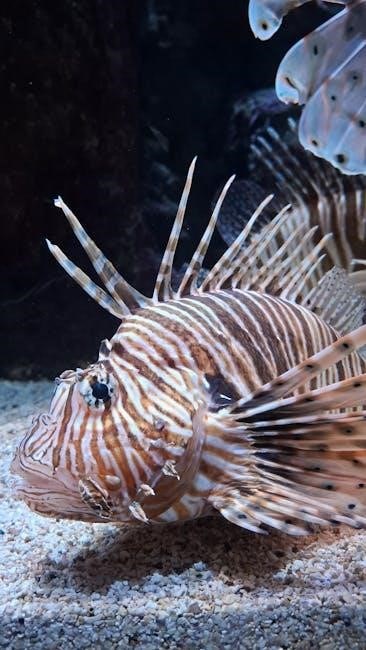
The 2024 AP Biology syllabus provides a comprehensive‚ college-level curriculum aligned with the College Board’s framework‚ emphasizing inquiry-based learning and preparing students for the AP exam.
Overview of the Course Structure
The 2024 AP Biology syllabus is structured to align with the College Board’s framework‚ focusing on four Big Ideas. The course is divided into units‚ starting with the Chemistry of Life‚ followed by Cell Structure and Function‚ Cellular Energetics‚ and the Cell Cycle. Each unit incorporates inquiry-based lab investigations and the 6 Science Practices‚ fostering critical thinking and scientific literacy. The curriculum is designed to build foundational knowledge progressively‚ ensuring students are well-prepared for the AP exam and future college-level biology courses.
Importance of the Syllabus for Student Success
The 2024 AP Biology syllabus is a core document guiding students through the course curriculum‚ ensuring alignment with College Board standards. It outlines learning objectives‚ unit breakdowns‚ and assessment methods‚ helping students stay organized and focused. By following the syllabus‚ students can effectively prepare for the AP exam‚ develop scientific literacy‚ and build skills in inquiry-based learning. It serves as a roadmap for mastering the material and achieving success in the course and beyond.
Big Ideas in AP Biology
The 2024 AP Biology syllabus emphasizes four Big Ideas: evolution‚ biological systems‚ interconnectedness‚ and homeostasis‚ providing a foundational framework for understanding life’s complexity and processes.
Big Idea 1: Evolution Drives the Diversity and Unity of Life
Big Idea 1 focuses on evolution as the driving force behind life’s diversity and unity. It explores mechanisms like natural selection‚ genetic drift‚ and gene flow‚ emphasizing how these processes shape populations over time. The syllabus highlights the role of evidence‚ including fossils‚ comparative anatomy‚ and molecular biology‚ to demonstrate evolutionary relationships. This idea underscores the interconnectedness of all life forms and prepares students to analyze evolutionary patterns and their biological significance‚ aligning with the College Board’s framework for AP Biology.
Big Idea 2: Biological Systems Utilize Free Energy and Molecular Building Blocks
Big Idea 2 examines how biological systems capture‚ store‚ and utilize free energy‚ emphasizing the role of molecules like carbohydrates‚ lipids‚ proteins‚ and nucleic acids. The syllabus delves into energy transformations‚ such as photosynthesis and cellular respiration‚ and explores the synthesis and breakdown of biomolecules. Students investigate how enzymes regulate metabolic pathways and how cells maintain homeostasis through energy exchanges. This idea connects molecular processes to the functioning of entire biological systems‚ fostering a deep understanding of energy flow and its importance in life processes.
Big Idea 3: Living Systems Are Interconnected and Interdependent
Big Idea 3 highlights the interconnectedness of living systems‚ emphasizing how organisms interact with their environment and other species. The syllabus explores ecosystems‚ energy flow‚ and nutrient cycling‚ illustrating how these processes sustain life. It also examines how cells‚ tissues‚ and organs function together to maintain organismal health. By studying these relationships‚ students understand how interactions at all levels‚ from molecular to ecological‚ contribute to the complexity and resilience of life on Earth.

Big Idea 4: Biological Systems Exhibit Homeostasis and Levels of Organization
Big Idea 4 focuses on how biological systems maintain homeostasis and are organized hierarchically. From cells to ecosystems‚ systems interact to sustain life. The syllabus explores how cells form tissues‚ tissues form organs‚ and organs form organ systems. It also examines feedback mechanisms that maintain stability in organisms and ecosystems. This idea underscores the interconnectedness of biological structures and processes‚ revealing how life is organized and regulated at every level to ensure survival and functionality.

Course Content and Units
The 2024 AP Biology syllabus organizes content into four core units: Chemistry of Life‚ Cell Structure and Function‚ Cellular Energetics‚ and Cell Cycle and Genetics.
- Unit 1 explores the chemical foundation of life and biological molecules.
- Unit 2 focuses on cell structure‚ transport‚ and signaling mechanisms.
- Unit 3 delves into cellular energetics‚ including photosynthesis and respiration.
- Unit 4 covers cell cycle regulation‚ genetics‚ and biotechnology applications.
Unit 1: Chemistry of Life
This unit introduces foundational chemical concepts essential for understanding biological processes. Topics include the structure of atoms‚ chemical bonds‚ and the properties of water. Students explore biological molecules such as carbohydrates‚ lipids‚ proteins‚ and nucleic acids‚ focusing on their functions and interactions. Additionally‚ the unit covers enzyme chemistry‚ pH‚ and the role of nutrients in biological systems. These concepts form the basis for advanced topics in subsequent units.
- Atomic and molecular structure
- Chemical bonds and reactions
- Biological macromolecules
- Enzyme function and regulation
- pH and biological systems
Unit 2: Cell Structure and Function
This unit delves into the structure and function of cells‚ the basic units of life. Students explore cell membranes‚ transport mechanisms‚ and signaling processes. The unit also covers organelles‚ their roles‚ and how cells maintain homeostasis. Topics include the cytoskeleton‚ cell division‚ and the differences between prokaryotic and eukaryotic cells. Understanding these concepts is crucial for analyzing cellular processes and their significance in biological systems.
- Cell membrane structure and transport
- Organelle functions and interactions
- Cell signaling and communication
- Cytoskeleton and cell movement
- Cell division mechanisms
Unit 3: Cellular Energetics
This unit explores how cells produce and utilize energy through photosynthesis and cellular respiration. Students examine the roles of ATP‚ mitochondria‚ and chloroplasts in energy transfer. Key topics include glycolysis‚ the Krebs cycle‚ and oxidative phosphorylation‚ as well as the light-dependent and light-independent reactions in photosynthesis. Emphasis is placed on the efficiency and regulation of these processes‚ aligning with the College Board’s framework for understanding cellular energetics.
- ATP production and utilization
- Cellular respiration stages and pathways
- Photosynthesis mechanisms and efficiency
- Energy transformation and storage
Unit 4: Cell Cycle and Genetics
This unit delves into the cell cycle‚ including mitosis‚ meiosis‚ and regulatory mechanisms. Students explore Mendelian and non-Mendelian inheritance‚ DNA replication‚ and gene expression. Key topics also cover genetic variation‚ chromosomal abnormalities‚ and modern genetic technologies. The unit emphasizes the principles of heredity and how genetic information is passed on‚ aligning with the College Board’s framework for understanding cellular and genetic processes.
- Cell cycle regulation and phases
- Meiosis and genetic diversity
- Laws of inheritance and Punnett squares
- Gene expression and mutation effects
Lab Investigations and Science Practices
The course emphasizes hands-on‚ inquiry-based lab investigations aligned with College Board standards‚ fostering critical thinking and scientific skills through data collection‚ analysis‚ and collaborative problem-solving.
Inquiry-Based Laboratory Work
The 2024 AP Biology syllabus emphasizes inquiry-based laboratory investigations‚ fostering scientific inquiry and critical thinking. Students engage in hands-on experiments‚ data collection‚ and analysis‚ aligning with College Board standards. These labs encourage collaborative problem-solving and the application of biological concepts. Pre- and post-lab quizzes assess understanding‚ while written reports and presentations develop communication skills. This approach prepares students for real-world scientific practices and the AP exam‚ ensuring a deep understanding of biological principles through active learning and experimentation.
6 Science Practices in Lab Activities
The 2024 AP Biology syllabus integrates six science practices to enhance laboratory learning. These include asking scientific questions‚ designing experiments‚ and analyzing data. Students construct explanations‚ argue from evidence‚ and evaluate information. Labs emphasize critical thinking‚ collaboration‚ and communication‚ aligning with College Board standards. These practices prepare students for real-world scientific inquiry‚ fostering a deeper understanding of biological concepts and their practical applications through hands-on‚ inquiry-based experiences.
Lab Reports and Presentations
The 2024 AP Biology syllabus requires students to complete lab reports and presentations‚ fostering scientific communication skills. These may include full lab reports‚ mini-posters‚ or Google Slide presentations. Students are assessed on their ability to articulate findings‚ analyze data‚ and defend conclusions. Such activities align with College Board standards‚ ensuring students gain practical experience in presenting scientific work and collaborating effectively. This enhances their ability to communicate complex biological concepts clearly and professionally.

Assessment and Evaluation
The 2024 AP Biology syllabus includes the AP exam‚ progress checks‚ quizzes‚ and lab assessments to evaluate student understanding and scientific inquiry skills effectively.
AP Biology Exam Format
The 2024 AP Biology exam includes multiple-choice questions and free-response sections‚ assessing scientific knowledge and critical thinking. The exam is divided into two sections: Section I (60 multiple-choice questions) and Section II (6 free-response questions). Students have 3 hours to complete the exam‚ with 1 hour and 30 minutes allocated for multiple-choice and 1 hour and 30 minutes for free-response questions. The exam evaluates understanding of biological concepts‚ laboratory skills‚ and the ability to articulate scientific reasoning. Reference materials are provided on exam day to ensure fairness and consistency across all test-takers.
Free-Response Questions and Lab Reports
The 2024 AP Biology exam includes free-response questions that assess critical thinking and scientific understanding. Students are required to answer 6 questions‚ with 25 minutes allocated for long free-response questions and shorter time for others. Lab reports and presentations are integral to the course‚ evaluating data analysis and communication skills. These may include full lab reports‚ mini-posters‚ or Google Slides presentations. Progress checks and quizzes are used to prepare students for these assessments‚ ensuring they can articulate scientific principles effectively.
Progress Checks and Quizzes
Progress checks and quizzes are integral to the 2024 AP Biology syllabus‚ enabling students to evaluate their understanding of key concepts. These assessments are administered online through the AP College Board Classroom platform‚ providing immediate feedback. They cover topics such as chemistry of life‚ cellular energetics‚ and genetics‚ ensuring students are well-prepared for the AP exam. Quizzes are often weekly or bi-weekly‚ complementing lectures and hands-on lab activities to reinforce learning and retention of biological principles.

Resources and References
The 2024 AP Biology syllabus includes College Board publications‚ recommended textbooks‚ and online tools‚ providing students with comprehensive resources to support their learning and exam preparation.
College Board Publications
The College Board provides essential resources‚ including the AP Biology Course and Exam Description and AP Biology Investigative Labs manual. These publications outline the curriculum framework‚ lab requirements‚ and exam format‚ ensuring alignment with course goals. They offer detailed guidelines for instructors and students‚ facilitating a structured approach to learning and assessment. These materials are crucial for understanding the course’s scientific principles and preparing effectively for the AP Biology Exam.
Recommended Textbooks
Recommended textbooks for AP Biology include Campbell Biology and Biology: The Core‚ which align with the College Board’s curriculum framework. These texts provide comprehensive coverage of key concepts‚ such as evolution‚ cellular energetics‚ and biological systems. They include interactive resources and labs‚ supporting inquiry-based learning. Additionally‚ AP Biology Investigative Labs by the College Board is highly recommended for hands-on activities. These materials ensure students are well-prepared for the course content and exam.
Online Tools and Materials
Online tools and materials for AP Biology include resources from the College Board‚ such as the AP Biology Course and Exam Description and AP Biology Investigative Labs. Additionally‚ digital textbooks and platforms like AP Classroom provide interactive lessons‚ practice exams‚ and progress checks. Online simulations and lab activities are also available to supplement learning. These resources support student engagement and preparation for the course content and exam‚ aligning with the syllabus requirements.
The 2024 AP Biology syllabus offers a structured‚ college-level curriculum designed to deepen students’ understanding of biological concepts. By focusing on inquiry-based learning and the four big ideas‚ the course prepares students for the AP exam and future academic challenges. With a blend of theoretical knowledge‚ lab investigations‚ and science practices‚ the syllabus ensures a comprehensive educational experience‚ equipping students with critical thinking‚ data analysis‚ and scientific inquiry skills essential for success in biology and beyond.




